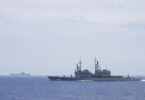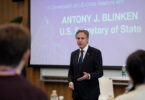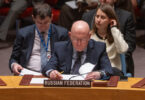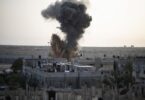WASHINGTON (AFP): US President Joe Biden warned Wednesday that Russia would pay a stiff price for invading Ukraine, including a heavy human toll and deep harm to its economy.
“If they actually do what they’re capable of doing with the force they’ve massed on the border, it is going to be a disaster for Russia,” Biden said in a press conference.
“Our allies and partners are ready to impose severe costs and significant harm on Russia and the Russian economy,” he said.
The US leader said that the Russian force would likely be able to prevail over time against the weaker Ukrainian military.
However, he said, “The cost of going into Ukraine in terms of physical loss of life, for the Russians … it’s going to be heavy.”
Of Vladimir Putin, Biden said he believes the Russian president “still does not want any full-blown war.”
He said Russia does not have good choices, and that going to war would result in “severe economic consequences,” from a cutoff of energy revenues to painful sanctions.
Sanctions will make it impossible for Russian banks to deal in US dollars, the world’s key trade currency, he said.
“So this is not all just a cakewalk for Russia,” he said.
But Putin does want to test the resolve of United States and its NATO allies in Europe, Biden said, and wants to weaken the Atlantic alliance.
The US leader said he was spending much time trying to keep NATO allies “on the same page” in confronting Russia.
“Putin has, I know, a stark choice, either escalation or diplomacy,” he said.
“I think he will pay a serious and dear price for it if he doesn’t think now.”
Blinken seeks united front with European allies
US Secretary of State Antony Blinken heads Thursday to Berlin for meetings with key European allies, as part of a whirlwind diplomatic tour to stop Russia from marching on Ukraine.
Blinken will seek a united front with counterparts from France and Germany as well as Britain’s junior foreign minister before his crunch talks with Russia’s Sergei Lavrov on Friday.
He had begun his tour on Wednesday with a first stop in Kyiv as a show of support, as he urged Vladimir Putin to stay on a “diplomatic and peaceful path”.
In Washington, President Joe Biden said Russia would pay a stiff price for invading Ukraine, including a heavy human toll and deep harm to its economy.
“It is going to be a disaster for Russia,” Biden said, adding that Moscow might ultimately prevail, but its losses are “going to be heavy”.
Biden insisted that Putin “still does not want any full-blown war”, but said the standoff could “easily get out of hand”.
And the US leader said he was open to a summit with Putin about the situation.
With tens of thousands of Russian troops massed on the Ukrainian border, fears are mounting that a major conflict could break out in Europe.
Biden sparked controversy Wednesday when he suggested that “something significantly short of a significant invasion” would be met with a lesser pushback from NATO.
“It’s one thing if it’s a minor incursion, and then we end up having a fight about what to do and not do, etcetera,” he said.
But the White House moved swiftly to clarify the comments, with Press Secretary Jen Psaki vowing any Russian movement in Ukraine would face “severe” retaliation.
Moscow insists it has no plans to invade but has at the same time laid down a series of demands — including a ban on Ukraine joining NATO — in exchange for de-escalation.
Washington has rejected Moscow’s demands as “non-starters” and NATO chief Jens Stoltenberg this week insisted that the alliance “will not compromise on core principles such as the right for each nation to choose its own path”.
The West has repeatedly warned Russia it would pay a “high price” of economic and political sanctions should it invade Ukraine.
With both sides’ positions entrenched, a series of talks between Western and Russian officials in Geneva, Brussels and Vienna has failed to yield any breakthrough.
– Dialogue preferred –
NATO allies have signalled their willingness to keep talking but Moscow has demanded a written response on its proposals for security guarantees.
On the Russian wish list are measures that would limit military activities in the former Warsaw Pact and ex-Soviet countries that joined NATO after the Cold War.
But in Kyiv, Blinken said he would not present such a formal response at Friday’s talks with Lavrov in Geneva.
Rather, the onus is on Putin to dispel fears that Moscow is planning an invasion of its pro-Western neighbour.
“I won’t be presenting (any) paper at that time to Foreign Minister Lavrov,” Blinken told reporters after meeting Ukrainian President Volodymyr Zelensky and Foreign Minister Dmytro Kuleba.
“We need to see where we are and see if there remain opportunities to pursue the diplomacy and pursue the dialogue which, as I have said, is by far the preferable course,” he said.
Ukraine has been fighting Moscow-backed forces in two breakaway eastern regions since 2014, when Russia annexed the Crimean peninsula from Ukraine.
More than 13,000 people have been killed, and the latest Russian troop build-up has also greatly rattled neighbours in the Baltics.
In an illustration of the rising stakes, Britain has said it would send defensive weapons to Ukraine as part of a package to help the country secure its borders.
Kyiv has repeatedly pleaded with Germany to send armaments, a call that has so far been rebuffed.
During her first visit to Ukraine on Monday, Foreign Minister Annalena Baerbock said Germany would “do its all to guarantee Ukraine’s security”, but again rejected the call for weapon shipments.
In Berlin, the controversial gas pipeline Nord Stream 2, which is due to double supplies of cheap natural gas from Russia to Germany, could once again surface as a sticking point among allies.
Amid the latest bout of tensions with Moscow, Chancellor Olaf Scholz has warned of consequences for the pipeline, which is operational but not yet in service as it awaits approval from Germany’s energy regulator.
In fresh sabre-rattling, Russian forces and those of ex-Soviet republic Belarus, which also neighbours Ukraine, launched joint military drills.
A US official said the exercises could presage a permanent Russian military presence involving both conventional and nuclear forces in Belarus.






